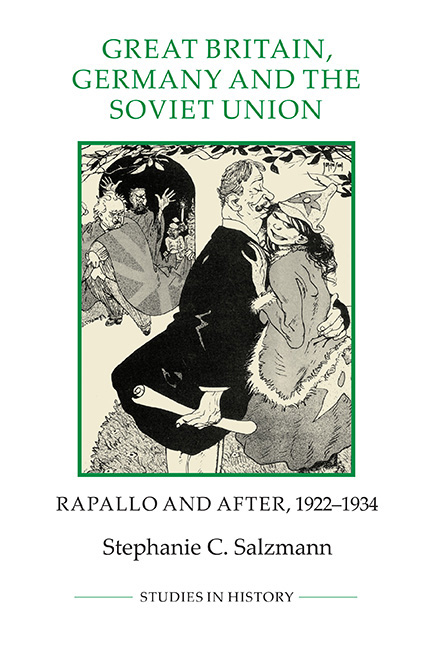Book contents
- Frontmatter
- Contents
- Acknowledgements
- Abbreviations
- Introduction
- 1 ‘It Nearly Overthrew the Applecart’: Lloyd George and the Treaty of Rapallo
- 2 ‘The Most Important Event Since the Armistice’: The Foreign Office and Rapallo
- 3 Rapallo's First Test: The Ruhr Crisis
- 4 The Policy of Conciliation: Rapallo and the First Labour Government
- 5 The Battle for the German Soul: Locarno and the Treaty of Berlin
- 6 Rapallo and the Rupture of Anglo-Soviet Relations
- 7 Rapallo and the Decline of the Locarno Spirit
- 8 An Economic Rapallo?
- 9 Rapallo and the Disarmament Conference
- 10 The Rapallo Relationship and Hitler's Rise to Power
- 11 The End of Rapallo: The German–Polish Non-Aggression Treaty
- Conclusion
- Bibliography
- Index
7 - Rapallo and the Decline of the Locarno Spirit
Published online by Cambridge University Press: 29 April 2017
- Frontmatter
- Contents
- Acknowledgements
- Abbreviations
- Introduction
- 1 ‘It Nearly Overthrew the Applecart’: Lloyd George and the Treaty of Rapallo
- 2 ‘The Most Important Event Since the Armistice’: The Foreign Office and Rapallo
- 3 Rapallo's First Test: The Ruhr Crisis
- 4 The Policy of Conciliation: Rapallo and the First Labour Government
- 5 The Battle for the German Soul: Locarno and the Treaty of Berlin
- 6 Rapallo and the Rupture of Anglo-Soviet Relations
- 7 Rapallo and the Decline of the Locarno Spirit
- 8 An Economic Rapallo?
- 9 Rapallo and the Disarmament Conference
- 10 The Rapallo Relationship and Hitler's Rise to Power
- 11 The End of Rapallo: The German–Polish Non-Aggression Treaty
- Conclusion
- Bibliography
- Index
Summary
After the rupture of Anglo-Soviet diplomatic relations, British foreign policy returned to normal. The British legation in Moscow was closed and Sir Robert Hodgson and his staff recalled to London. Soviet Russia retreated into the background of British attention. Western European problems once again dominated British foreign policy. Until its fall from power in June 1929, the Conservative government focused on disarmament and a further revision of the treaty of Versailles. The evacuation of the Rhineland and reparations were the predominant issues.
Germany had joined the preparatory disarmament conference in November 1927. The principal problem throughout the many years of negotiation was how to combine the German demand for revision of the peace treaty and equality of rights with the French request for security. The question of security equally overshadowed the negotiations for the evacuation of the Rhineland. A withdrawal of Allied troops deprived Paris of her last opportunity to control Germany's military strength and prevent a future German attack on French territory. The recurrent French nightmare of a third German invasion within a lifetime was deep-rooted, and made France's demand for security almost impossible to satisfy. An additional problem was the reparations issue. To make Germany pay for the lost war was a means of controlling her economic recovery and of preventing her from regaining the position of the predominant economic power in Europe.
With the years that passed since the end of the war, Germany's demand for revision became increasingly outspoken and impatient. After Locarno and the noticeable improvement of Germany's economic and political situation, Berlin's pressure on Britain and France grew, first as the result of Locarno's expected effects, but also due to the increasing intervention of popular opinion and sectional interest groups. An additional factor from May 1928 was Stresemann's failing health, which increased his sense of urgency in obtaining his foreign policy goals. Germany's apparent economic stability raised hopes for a return to her former independent great power status. In this foreign policy objective the German foreign minister was not driven by outside pressure alone. He was clearly a revisionist himself, convinced that he had to accomplish his task of liberating Germany from the shackles of Versailles – and he wanted to harvest the fruits of his labour before he died.
- Type
- Chapter
- Information
- Great Britain, Germany and the Soviet UnionRapallo and after, 1922-1934, pp. 89 - 101Publisher: Boydell & BrewerPrint publication year: 2002



